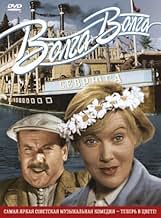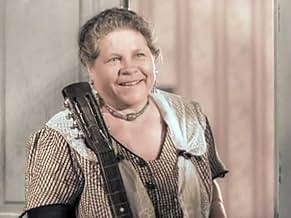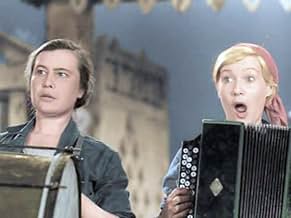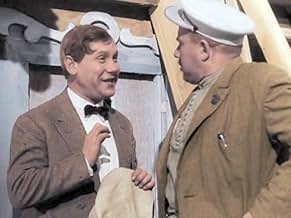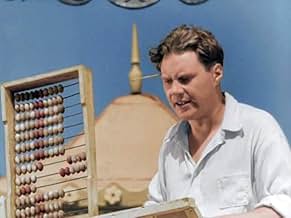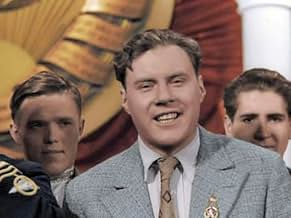Widely claimed to be Joseph Stalin's favorite movie, this classic musical comedy is a must-see. The action takes place on a steamboat on the iconic Volga River, as two groups of performers t... Read allWidely claimed to be Joseph Stalin's favorite movie, this classic musical comedy is a must-see. The action takes place on a steamboat on the iconic Volga River, as two groups of performers travel to Moscow to perform in the Moscow Musical Olympiad.Widely claimed to be Joseph Stalin's favorite movie, this classic musical comedy is a must-see. The action takes place on a steamboat on the iconic Volga River, as two groups of performers travel to Moscow to perform in the Moscow Musical Olympiad.
- Awards
- 1 win total
Anatoli Shalayev
- The Boy Musical Prodigy
- (as Tolya Shalayev)
Mariya Mironova
- The Secretary
- (as M. V. Mironova)
Nikita Kondratyev
- The Waiter
- (as N. S. Kondratyev)
Vsevolod Sanaev
- The Lumberjack
- (as V. V. Sanayev)
Alexei Dolinin
- The Militia Man
- (as A. G. Dolinin)
Ivan Chuvelyov
- The Olympiad Representative
- (as I. P. Chuvelyov)
Nikolai Khryashchikov
- Appearing
- (uncredited)
Yakov Rykov
- Tugboat captain
- (uncredited)
Lidiya Vinogradova
- Amateur Performer
- (uncredited)
Featured reviews
As most of its (all too few) viewers know, »Volga Volga« was supposed to be the Soviet counterpart to Hollywood musical comedies of the time. It is also well-known it was Stalin's favourite movie... So what? Wagner was Hitler's favourite composer does that make him a bad composer? Hitler also loved Greta Garbo, Charlie Chaplin, Marlene Dietrich... does that make them trash?
However, I *do* find it fascinating that Stalin loved this film. I find it even more fascinating that the film was released for the general public to see, and that its director wasn't sent to Siberia.
Yes, it has propaganda written all over it in the same fashion as the contemporary »Yankee Doodle Dandy« has, to mention just one famous non-Soviet example. But what makes this film such a wonderful comedy is the intelligent at times spine-chilling humour of the dialogues. However, only viewers who are familiar with the Soviet political (and general) culture of the time will appreciate them or even notice them. If one doesn't know that the young man is reciting a very famous poem by Lermontov when trying to impress the semi-illiterate political chieftain, it will be very difficult to appreciate the latter's bewildered expression and his reply: »Oh, begone with your self-critique, save it for the next political meeting« (I am quoting from memory, based on the original, not on the English translation, which I am not familiar with). Indeed, one has to know what »self-critique« meant... If you do, you'll find it a cracking-funny dialogue. The same goes for many, many other scenes like the one when the ship's cook introduces (and re-introduces) himself to the ignorant political chief, starting merrily as a »chef« and ending up as a »food-processing worker«. And then some scenes are sheer poetry: like the one when the entire village is chanting the contents of a telegram from the river bank, so that the eager recipient of the telegram already embarked on a ship - will hear it..:)
The ideology behind it is clear: only the peasants sorry, »land workers« - are healthy and wise. The only jerk in the film is the hilariously ignorant and self-important representative of the political »authorities«. This, I suppose (besides the wonderful humour and the cheerful music), is what made this film so popular with the »masses«. And this must be also the reason why the film was released. (In 1938, no less when political »purging« was at its worst.)
There are however, certain scenes in the film that make me wonder how on earth it made it past the censors. (Due to Stalin's personal intervention, no doubt?) The oddest example comes towards the end of the film, when the political chieftain is asked by the port authorities whether he is the author of the (title) song »Volga Volga«. Panicking, he not only blames someone else (»Shulbert«, Franz Schubert to you and me) regardless of the fact that »Shulbert« most definitely did NOT »do« it - but he starts screaming: »I confess nothing, I confess nothing!«, even though nobody had asked him to confess anything... Only those who know what »confession« implied can find his mindless reaction hilarious and spine-chilling.
It is said that Stalin had a copy of this film delivered to the USA authorities. They were so baffled by it that they searched it for hidden messages. If this is true, it just goes to show how little they understood and knew about each other.
Or is there a hidden message...? :)
However, I *do* find it fascinating that Stalin loved this film. I find it even more fascinating that the film was released for the general public to see, and that its director wasn't sent to Siberia.
Yes, it has propaganda written all over it in the same fashion as the contemporary »Yankee Doodle Dandy« has, to mention just one famous non-Soviet example. But what makes this film such a wonderful comedy is the intelligent at times spine-chilling humour of the dialogues. However, only viewers who are familiar with the Soviet political (and general) culture of the time will appreciate them or even notice them. If one doesn't know that the young man is reciting a very famous poem by Lermontov when trying to impress the semi-illiterate political chieftain, it will be very difficult to appreciate the latter's bewildered expression and his reply: »Oh, begone with your self-critique, save it for the next political meeting« (I am quoting from memory, based on the original, not on the English translation, which I am not familiar with). Indeed, one has to know what »self-critique« meant... If you do, you'll find it a cracking-funny dialogue. The same goes for many, many other scenes like the one when the ship's cook introduces (and re-introduces) himself to the ignorant political chief, starting merrily as a »chef« and ending up as a »food-processing worker«. And then some scenes are sheer poetry: like the one when the entire village is chanting the contents of a telegram from the river bank, so that the eager recipient of the telegram already embarked on a ship - will hear it..:)
The ideology behind it is clear: only the peasants sorry, »land workers« - are healthy and wise. The only jerk in the film is the hilariously ignorant and self-important representative of the political »authorities«. This, I suppose (besides the wonderful humour and the cheerful music), is what made this film so popular with the »masses«. And this must be also the reason why the film was released. (In 1938, no less when political »purging« was at its worst.)
There are however, certain scenes in the film that make me wonder how on earth it made it past the censors. (Due to Stalin's personal intervention, no doubt?) The oddest example comes towards the end of the film, when the political chieftain is asked by the port authorities whether he is the author of the (title) song »Volga Volga«. Panicking, he not only blames someone else (»Shulbert«, Franz Schubert to you and me) regardless of the fact that »Shulbert« most definitely did NOT »do« it - but he starts screaming: »I confess nothing, I confess nothing!«, even though nobody had asked him to confess anything... Only those who know what »confession« implied can find his mindless reaction hilarious and spine-chilling.
It is said that Stalin had a copy of this film delivered to the USA authorities. They were so baffled by it that they searched it for hidden messages. If this is true, it just goes to show how little they understood and knew about each other.
Or is there a hidden message...? :)
Allegedly, this was Joseph Stalin's favourite film, and it may be interesting to see for oneself what amused one of the sickest minds in history. Apart from that historical aspect, this film has no basis in reality, moreover, it never did. While millions of Russian citizens were being sent to concentration camps for no reason except suspicion of treason (whatever that meant), this film depicts life in the Imaginary Soviet Union, where people live happy and carefree lives. A good example of how Soviet propaganda worked itself out in the Russian cinema. Aesthetically, there are many good Russian -- even Soviet -- films. However,this one isn't one of them.
This 1938 musical comedy from the Soviet Union directed by Grigori Alexandrov has some fame as Stalin's favorite movie. He liked it so much he has it shown in his private screening room at the Kremlin to his Politburo colleagues scores of time. He repeatedly teased Khrushchev for his likeness to Byvalov, the humorless village bureaucrat played by Igor Ilinsky.
The movie opens with an amusing intro in which a catchy song mentions the main cast and the characters they play. Then it moves to a scene showing the two love interests of the film kissing in the mouth (the kiss is far more passionate than what most movies from the West would permit at the time). And then we go to the main story. In a country village along the Volga River, there is a friendly competition between a folk music band (led by the beautiful Lyubov Orlova) and a more conventional classical music outfit, which is led by her boyfriend, Alyosha (played by Andrei Tutyshkin). When in the village they heard there is a musical contest for country bands in Moscow, and despite the initial opposition of the bureaucrat, both bands take the river boat to reach the capital.
Naturally for a musical comedy, the finest thing in the film is the musical numbers. The best in my opinion comes around the middle when virtually all the village gets into playing different tunes to convince the bureaucrat that they have talent worthy of going to the contest in Moscow. The movie oozes nostalgia for the simple village life (in a time when the Soviet Union was rapidly urbanizing) and is also how the Soviet government has made life so much better than now villagers mostly has to worry not about surviving but about playing in music contests. Only towards the end the movie falls into the territory of heavy propaganda. The sympathy of Orlova helps (though sometimes she stretches it too far).
The movie opens with an amusing intro in which a catchy song mentions the main cast and the characters they play. Then it moves to a scene showing the two love interests of the film kissing in the mouth (the kiss is far more passionate than what most movies from the West would permit at the time). And then we go to the main story. In a country village along the Volga River, there is a friendly competition between a folk music band (led by the beautiful Lyubov Orlova) and a more conventional classical music outfit, which is led by her boyfriend, Alyosha (played by Andrei Tutyshkin). When in the village they heard there is a musical contest for country bands in Moscow, and despite the initial opposition of the bureaucrat, both bands take the river boat to reach the capital.
Naturally for a musical comedy, the finest thing in the film is the musical numbers. The best in my opinion comes around the middle when virtually all the village gets into playing different tunes to convince the bureaucrat that they have talent worthy of going to the contest in Moscow. The movie oozes nostalgia for the simple village life (in a time when the Soviet Union was rapidly urbanizing) and is also how the Soviet government has made life so much better than now villagers mostly has to worry not about surviving but about playing in music contests. Only towards the end the movie falls into the territory of heavy propaganda. The sympathy of Orlova helps (though sometimes she stretches it too far).
Even those of us with some sort of education in the field of cinema rarely get to see other Soviet films than those of Eisenstein, Tarkovskij and maybe Pudovkin. It´s easy for every western film fan to become as prejudiced as the bureaucrat Byvalov in Volga-Volga: "Talent? in this dump?" My point being, of course, that it would be unfair to world cinema as well as to oneself if one were to deny oneself the pleasures of at least once in a while seeing a Feuillade serial, a German mountain film or a Soviet musical. Volga-Volga is an excellent choice for the curious cinephile. As everyone points out, it has the distinction of reportedly being Stalin´s favourite film, it has stars in it is well as great music, I could go on and on. The main reason for seeing Volga-Volga is of course that it´s great fun. It had me in stitches more than once.
A comment on polart´s vhs edition of Volga-Volga: Granted, the subtitles are yellow and eminently readable, but they are also quite often badly timed and frequently seem insufficient. Also, the framing seems to be slightly off, something i´m hesitant in blaming comrades Alexandrov and Petrov for.
A comment on polart´s vhs edition of Volga-Volga: Granted, the subtitles are yellow and eminently readable, but they are also quite often badly timed and frequently seem insufficient. Also, the framing seems to be slightly off, something i´m hesitant in blaming comrades Alexandrov and Petrov for.
"Volga-Volga", directed by Alexandrov (Eisenstein's cameraman in "Ten Days" and other Soviet classics), is perhaps the best of a series by him that provides a Russian echo of Busby Berkeley's work in the US. Like Berkeley, Alexandrov has been attacked by some at present who see only the escapist side of this type of musical fantasy/comedy. But "Volga-Volga" also barbs "bureaucratic commissars" as did "Golddiggers of 1933" skewer "stuffy aristocrats".
Wonderful music and vaudeville-style entertainment, with Lyubov Orlova heading a talented cast, insured that "Volga-Volga" is perhaps the film most beloved by ordinary Russians ever made in the Soviet Union; it certainly was during the '30s and '40s. That Stalin presented a personal gift copy to Roosevelt during the war probably elicited the approbation "Stalin's Favorite Film". It was clear that he was proud of it, and we were allies. Today one would have to be a pretty unregenerate cold warrior or slavophobe to be offended by "Volga-Volga".
The plot: like with Berkeley, not so important. It involves a running competition (including a boat race down the Volga river) between a folk music band and a more formal village orchestra. There is singing, dancing, romance. And a happy ending.
Now you can judge for yourself. A crystal-clear VHS copy of this (and other Alexandrov '30s musicals) is distributed by Polart with easy-to-read yellow subtitles (I wish all foreign films were so graced).
Wonderful music and vaudeville-style entertainment, with Lyubov Orlova heading a talented cast, insured that "Volga-Volga" is perhaps the film most beloved by ordinary Russians ever made in the Soviet Union; it certainly was during the '30s and '40s. That Stalin presented a personal gift copy to Roosevelt during the war probably elicited the approbation "Stalin's Favorite Film". It was clear that he was proud of it, and we were allies. Today one would have to be a pretty unregenerate cold warrior or slavophobe to be offended by "Volga-Volga".
The plot: like with Berkeley, not so important. It involves a running competition (including a boat race down the Volga river) between a folk music band and a more formal village orchestra. There is singing, dancing, romance. And a happy ending.
Now you can judge for yourself. A crystal-clear VHS copy of this (and other Alexandrov '30s musicals) is distributed by Polart with easy-to-read yellow subtitles (I wish all foreign films were so graced).
Did you know
- TriviaFamously, this was Joseph Stalin's favorite film and he would often show off how well he knew it by performing every part just before the actors on screen.
- ConnectionsFeatured in Komediya davno minuvshikh dney (1980)
Details
- Runtime
- 1h 48m(108 min)
- Color
- Sound mix
- Aspect ratio
- 1.37 : 1
Contribute to this page
Suggest an edit or add missing content

